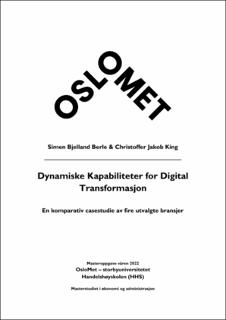Dynamiske Kapabiliteter for Digital Transformasjon, En komparativ casestudie av fire utvalgte bransjer
Master thesis
Submitted version
Permanent lenke
https://hdl.handle.net/11250/3026521Utgivelsesdato
2022Metadata
Vis full innførselSamlinger
Sammendrag
This master thesis explores how companies in different industries manage digital
transformation. As a result of rapid changes in technology, companies need to dynamically
adapt their resources. This will enable them to embrace and adapt new technologies to further
achieve competitiveness and value creation.
Through a comparative case study, data has been collected with qualitative interviews from
twelve anonymous companies in four different industries: (1) banking, finance and insurance,
(2) retail, (3) transport, logistics and infrastructure as well as (4) oil, gas and energy. There is
limited research on the practical implications and the connection between dynamic
capabilities and digital transformation. Therefore, this study is based on the following research
question: How do companies in Norway within different industries cope with digital
transformation, and can the industries learn something from each other?
This master's thesis has addressed seven topics related to a successful digital
transformation: strategy and ecosystem, innovation thinking, DT technologies, data,
operations, organizational design and DT leadership. This study shows that the oil, gas and
energy industry has the highest overall score regarding the seven topics and is thus a leader
in the digital transformation process. The retail industry and the banking, finance and
insurance industry are following suit, while the transport, logistics and infrastructure industry
is further behind in the digital transformation process. Nevertheless, the industries have
strong capabilities in various areas, and can learn from each other in terms of digital business
strategy, innovation processes, collaboration, organizational structure and technology.
